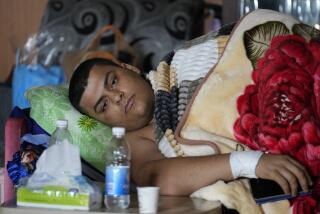Deadly Clashes Continue in Sunni Area of Baghdad
- Share via
BAGHDAD — Urban clashes continued for a second day in a volatile Sunni Arab neighborhood of northern Baghdad, leaving at least five Iraqis dead and 20 wounded in fighting Tuesday between gunmen and Iraqi security forces.
Witnesses described the hostilities as sectarian gun battles between Sunni Muslim residents and the Shiite Muslim-led security forces. But Iraqi officials said outside insurgents had infiltrated the capital’s Adhamiya quarter and provoked clashes with police and the army. Fighting in the district Monday left at least three people dead.
By late Tuesday morning, Iraqi army troops had moved in and a measure of calm had returned. Authorities had sealed off main roads into the neighborhood, and U.S. helicopters scanned the area from above.
“Now the situation is good and calm,” Iraqi army Maj. Gen. Jawad Rumi Daini said in a telephone interview. “Armed men from outside Adhamiya wanted to make trouble inside, and we eliminated them.”
But the district’s mostly Sunni residents blamed elements of the security forces. They said specialized units of the Interior Ministry had been acting as sectarian death squads and terrorizing their community.
“The young people of Adhamiya picked up their personal weapons to defend their neighborhoods,” said a man emerging on foot from an area near one of the checkpoints at the district’s edge. “I will not go back home today because the situation is unbearable. Every night when I sleep, I put my gun under the pillow with a bullet in the chamber.”
Iraq’s Sunni minority and Shiite majority have been engaged in a struggle for power and influence since the 2003 U.S.-led invasion. Sunni Arab, Shiite and Kurdish political leaders have been deadlocked in government-formation talks for months, each prospect of progress on one post quickly dashed by squabbling over other positions.
The political talks stumbled Tuesday despite international pressure. U.N. special envoy Ashraf Jehangir Qazi, in a statement condemning the violence in Adhamiya, urged Iraqi officials to form a government as a first step toward creating “an environment in which rising sectarian tensions in Iraq could be tackled.”
The mostly middle-class district, across the Tigris River from the mostly Shiite Kadhimiya area, was a hot spot of insurgent activity in 2004 but has calmed considerably. Community leaders say fear of Shiites recently has spurred them to arm themselves and form militias.
“This area has a Sunni majority and it’s very close to Kadhimiya, which has a Shiite majority,” Amel Qazi, a Sunni legislator living in Adhamiya said in a phone interview. “People in Adhamiya think the Kadhimiya people want to control their area and conduct sectarian cleansing.”
Witnesses described desperate circumstances in the district. Ambulances waited at checkpoints to ferry doctors and nurses to area hospitals.
“There were no cars and no one walking in the main streets,” said Alaa Mohammed Ali, a 47-year-old dealer in electrical appliances who was leaving the area on foot. “Most of the families are trapped in their homes. I saw some women standing outside their homes asking for the whereabouts of their sons.”
Later, an Iraqi Defense Ministry spokesman took to the airwaves to condemn the attacks and deliver a stern warning to residents who have begun organizing themselves into neighborhood militias, which many observers see as among the most disturbing layers of armed activity dogging the country.
“These types of actions do none of you any good,” Gen. Mohammed Abdul-Razzaq said. “In the future, if such actions happen the army will use force in its true sense.”
Elsewhere in Baghdad on Tuesday, roadside bombs killed at least three Iraqis and injured 26, and the Associated Press reported a bomb that exploded outside a cafe killed seven people. Also, in various parts of the city, authorities discovered 15 bodies with their hands bound behind them and with a single shot to the back of the head.
Lawlessness has increased over the last two days on the streets of Kirkuk, the oil-rich northern city contested by ethnic Kurds, Arabs and Turkmens.
On Tuesday, suspected insurgents fatally shot an Iraqi soldier, fired mortar rounds at an Iraqi army base and blew up a passing police vehicle convoy, injuring two officers, said Capt. Abbas Khaled of the Kirkuk police.
*
Times special correspondent Ali Windawi in Kirkuk contributed to this report.
More to Read
Sign up for Essential California
The most important California stories and recommendations in your inbox every morning.
You may occasionally receive promotional content from the Los Angeles Times.












